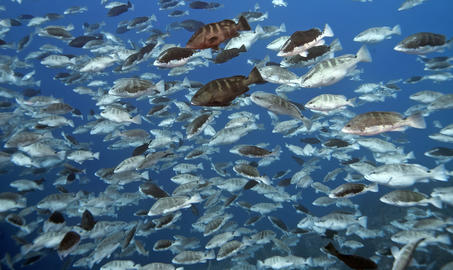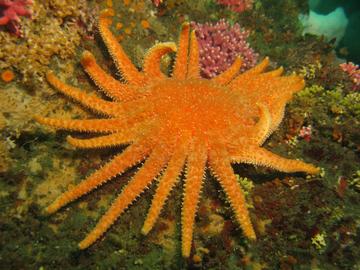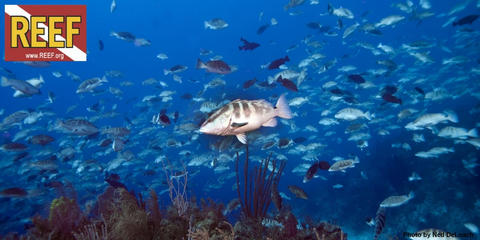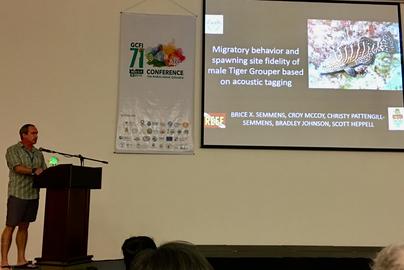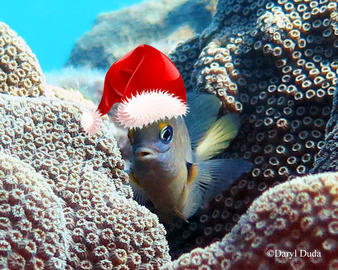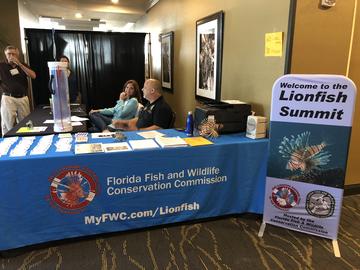Last month, the Grouper Moon Project - a highly successful conservation science collaboration between REEF and the Cayman Islands Department of Environment - wrapped up its 18th year of work in Little Cayman. Because all of the field work takes place during a few weeks around the winter full moons when the Nassau Grouper aggregate to spawn, the team prepares all year to ensure success for the big event. As we reported in last month’s e-News, because of this year's moon calendar, we sent research teams to Little Cayman in both January and February.
The study used almost 11,000 REEF Volunteer Fish Survey Project surveys collected between California and Alaska between 2006 and 2017 to evaluate the massive decline of the Sunflower Sea Star (Pycnopodia helianthoides). The authors documented a precipitous decline in the important species, primarily linked to the devastating sea star wasting disease epidemic that was wide-spread along the US and Canadian west coast starting in 2013, as well as warming ocean temperatures. In many places, the Sunflower Sea Stars have failed to return.
We are proud to share the newest scientific publication that includes data from the REEF Volunteer Fish Survey Project. The study, published last month in the journal Science Advances, used REEF data from the Pacific Coast to evaluate the massive decline of the Sunflower Sea Star (Pycnopodia helianthoides). The study's analysis included almost 11,000 REEF surveys collected by our citizen scientists from California to Alaska over the last decade.
REEF scientists and volunteers are gearing up another season of the Grouper Moon Project, a collaborative research effort with the Cayman Islands Department of the Environment (CIDOE). This important project focuses on one of the largest (and one of just a few) known spawning aggregations of Nassau Grouper in the Caribbean. Over 6,000 grouper amass in one location for 7-10 days following winter full moons.
Caroly’s Notes
REEF staff, board members, and project collaborators recently joined over 300 scientists, resource managers, and fishers at the Gulf and Caribbean Fisheries Institute (GCFI) meeting in San Andres, Colombia. GCFI aims to apply fisheries and marine science to solve problems by bringing multiple users of ocean resources together to make informed and coordinated decisions for sustainable use of these resources. REEF staff regularly attend GCFI to share findings and perspectives from our various programs. This year, REEF's Director of Science, Dr.
When we think about climate change, habitat destruction, and the many other challenges our oceans are currently facing, it’s easy to question how to make an impact. The answer is that together we can make a positive difference. For 25 years, REEF has worked to protect biodiversity and ocean life, through citizen science, education, and partnerships with the scientific community. REEF is regarded as one of the most effective and efficient marine data collection and conservation organizations in the world.
Caroly’s Notes
On October 2-4, REEF’s Invasive Species Program Coordinator, Dr. Alli Candelmo, and Environmental Leadership Intern, Sophie Costa, joined regional researchers, invasive species managers, divers, and ocean conservationists at the Florida Fish and Wildlife Commission 2018 Lionfish Summit. The summit addressed three main themes: Policy & Regulation, Control Efforts/Research & Monitoring and Education & Outreach. Alli presented as an invited speaker on the trends of ten years of REEF lionfish derbies and lionfish movement patterns and the application to improving removal efforts.
September was an exciting month for members of the Pacific Northwest REEF Advanced Assessment Team (AAT), led by REEF's Citizen Science Program Manager Janna Nichols. This group of expert level surveyors (Levels 4 and 5) helped with the ongoing monitoring project done in partnership with UC Davis' SeaDoc Society in Washington's San Juan Islands.

